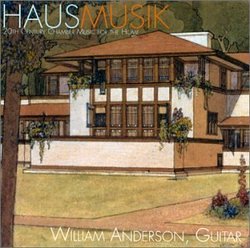Unique and Spectacular Guitar recording
marsyas | Chicago | 10/12/2000
(5 out of 5 stars)
"Hausmusik features classical guitarist William Anderson with his colleagues from the Cygnus Ensemble in stunning performances of 20th c. solo and chamber music, much of which has never been recorded before. The disc opens with a splashy irresistable rendition of Hindemith's Rondo for Three Guitars (1925). The recording takes its title from a composition by Kreneck call Hausmusik. In this set of 7 short pieces recorders, violin, guitar and piano are used in different combinations. Despite the domestic intent of the music, these are striking pieces. It is fabulous to hear recorders used as vehicles for Kreneck's atonal language. Hans Erich Apostel's Sechs Musiken gets spectacular treatment in Anderson's Hands. These European works are mirrored by American music that is also tied in with the hausmusik idea--Robert Martin's exquisite little piece called Henry's Lullaby was written for Anderson's son Henry. Jon Dawe's Under the Tafelmusik takes the Hausmusik theme into surreal world that time trips from the 17th century Baroque period to Y2K post-serialism. It is a crazy piece with great rhythmic drive. Anderson's Variations combine Baroque brisee writing with almost-tonal harmony. The second variation is Schumannesque. The third is a bubbly faster movement with a pop feel. The theme, Jerome Kern's Long Ago and Far Away is finally heard, not quite intact, in the last variation. None of the American pieces strike one as too European, but they share certain musical values with the European works on the disc--they share a desire to create mulidimensional musical space without getting out of reach of the lay listener. I would say that even about Milton Babbitt's Danci."
Wow!
Dorothy Wood | Harrisburg, PA | 10/25/2000
(5 out of 5 stars)
"This is the best classical guitar recording now on the market. There is no guitarist who can play with such nuance as William Anderson. The music on this disc ranges from fun and splashy (Hindemith, Kreneck and Gorelli) to richly decorative (Anderson, Hindemith) to surprising (Martin and Dawe, Apostel). The idea of doing a compilation of 20th Century chamber music for the home is something that someone should have thought of doing a long time ago. In the case of music of Hindemith, Kreneck and Apostel, these are works from a culture that had exhausted itself in the most spectacular fashion (as described in Thomas Mann's Dr. Faustus or Robert Musil's The Man Without Qualities)-- a culture headed over a cliff. The German/Austrian Hausmusik movement addressed the alienation of the middle class musical patrons who were alienated by music's progress. But Anderson slyly switches the scene to America--Kreneck and Hindemith both spent the latter part of their lives here. The American music on this collection is not at all beholden to Europe, but it has whole-heartedly embraced, and even surpassed its European musical predecessors, ultimately achieving that incredible kind of sea-change that is the quintessence of American culture."


 Track Listings (29) - Disc #1
Track Listings (29) - Disc #1